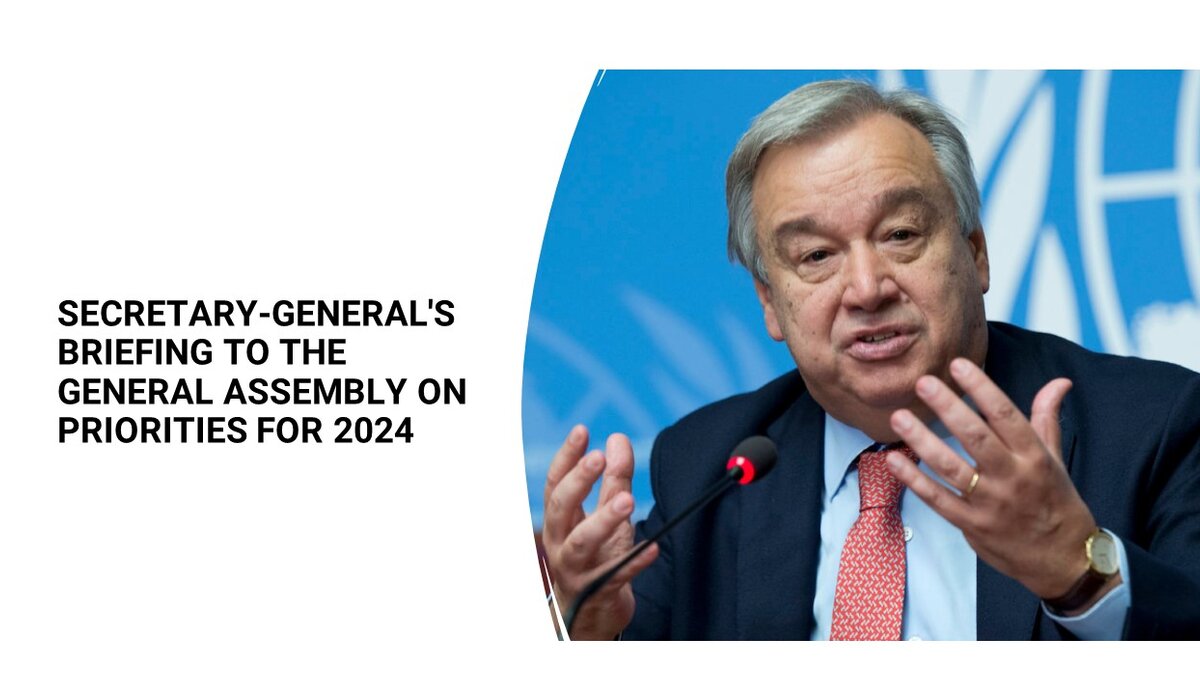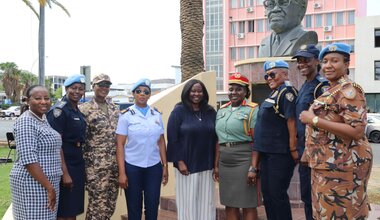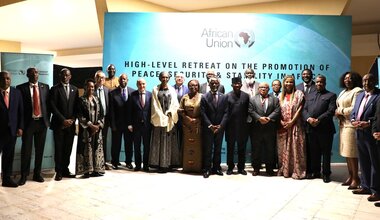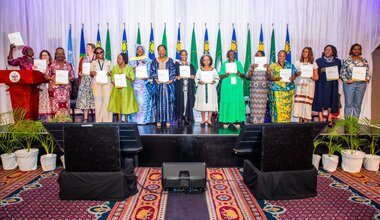UN Secretary-General Priorities for 2024 | General Assembly briefing | United Nations
Mr. President of the General Assembly, Excellencies, Ladies and gentlemen,
Let me begin by extending my very best wishes for 2024.
I wish health and happiness for you and your families -- and peace for our world.
Our organization was founded on the pursuit of peace.
Peace is our raison d’être.
Yet as I scan the landscape of today’s world, the one thing missing most dramatically is peace.
And by that, I mean peace in all its dimensions.
As conflicts rage and geopolitical divisions grow, peace in our world is threatened.
As polarization deepens and human rights are trampled, peace within communities is undermined.
As inequalities explode, peace with justice is shattered.
As we continue our addiction to fossil fuels, we make a mockery of any notion of peace with nature.
Around the globe, and across the range of issues, peace is the missing piece.
People want peace and security.
People want peace and dignity.
And, frankly, they want peace and quiet.
There is so much anger and hate and noise in our world today.
Every day and at every turn, it seems – it’s war.
Terrible conflicts that are killing and maiming civilians in record numbers.
Wars of words. Turf wars. Culture wars.
So many peddling the perverse math that says you multiply support by dividing people.
This is especially troubling in a year when half of humanity will go to the polls.
Meanwhile, more and more families are falling behind.
More and more countries are drowning in debt.
More and more people are losing trust in institutions and faith in the political process.
Peace is the way out of these interlinked crises.
Peace is more than a noble vision.
Peace is a rallying cry. It is a call to action.
Our obligation is to act together for peace in all its dimensions.
Excellencies,
Despite the turbulence of our times, there are reasons for hope.
At the SDG Summit, world leaders endorsed an SDG Stimulus and the need for far-reaching reforms of the international financial architecture.
Countries also reached agreement last year on the High Seas Treaty to protect precious marine biodiversity from pollution and overfishing.
We are making some headway on climate justice. The Loss and Damage Fund – provided that it is well-resourced – will help vulnerable countries recover from the impacts of extreme weather.
The Security Council agreed to our years-long call to back peace enforcement and counter-terrorism operations led by regional partners, notably the African Union, with mandates from the Council and supported by assessed contributions.
The new High Level Advisory Body on Artificial Intelligence launched a global conversation on how this all-pervading technology can benefit us all.
Looking ahead, at the Summit of the Future in September, we have a chance to shape multilateralism for years to come.
And indeed our world badly needs:
Reform of the Security Council.
Reform of the international financial system.
The meaningful engagement of youth in decision-making.
A Global Digital Compact to maximize the benefits of new technologies and minimize the risks.
An emergency platform to improve the international response to complex global shocks.
I see a truly dynamic effort to build a more effective, inclusive and renewed multilateralism tuned to the 21st century and our increasingly multipolar world.
And you are at the heart of this essential effort.
And peace is at the heart of all we do.
Excellencies,
For millions of people caught up in conflict around the world, life is a deadly, daily, hungry hell.
Record numbers are fleeing their homes in search of safety.
They are crying out for peace.
We must hear them, and act.
In the immediate term, we must continue to push for peace across the globe.
The situation in Gaza is a festering wound on our collective conscience that threatens the entire region.
Nothing justifies the horrific terror attacks launched by Hamas against Israel on 7 October.
Nor is there any justification for the collective punishment of the Palestinian people.
Yet, Israeli military operations have resulted in destruction and death in Gaza at a scale and speed without parallel since I became Secretary-General.
I am especially alarmed by reports that the Israeli military intends to focus next on Rafah – where hundreds of thousands of Palestinians have been squeezed in a desperate search for safety.
Such an action would exponentially increase what is already a humanitarian nightmare with untold regional consequences.
It is time for an immediate humanitarian ceasefire and the immediate and unconditional release of all hostages.
This must rapidly lead to irreversible actions towards a two-state solution, based on United Nations resolutions, international law and previous agreements.
In Ukraine, I repeat my call for a just and sustainable peace, in line with the UN Charter and international law -- for Ukraine, for Russia and for the world.
In a swathe of countries across the Sahel, terrorism is spiking, and civilians are paying a terrible price. We will not relent in supporting the people of the Sahel in these troubling times.
Collective action is essential in the Horn of Africa to consolidate the hard-won gains against Al Shabaab and to preserve the fundamental principle of territorial integrity avoiding new crises.
The fighting must stop in Sudan before it destroys even more lives and spreads.
In Libya, while a ceasefire holds, the Libyan people deserve sustained peace and stability, starting with a commitment to free and fair elections.
In eastern Democratic Republic of [the] Congo, I call on all armed groups to lay down their weapons and I urge regional leaders to prioritize dialogue.
In Yemen, I appeal to all parties to focus on the path to peace and also to de-escalate tensions in the Red Sea based on the principle of freedom of navigation.
In Myanmar, we need sustained international and regional attention to help urgently forge a path towards a democratic transition and return to civilian rule.
In Haiti, lawlessness is surging and millions face acute food insecurity. The Multinational Security Support mission must be deployed without delay and I hope all obstacles will be removed, and I also urge Member States to provide the necessary financial support.
And in the western Balkans, some leaders continue to stoke tensions and ethno-nationalistic rhetoric. I urge action for reconciliation, stability and economic prosperity across the region.
Excellencies,
If countries fulfilled their obligations under the Charter, every person’s right to a life of peace and dignity would be guaranteed.
But governments are ignoring and undermining the very tenets of multilateralism – with zero accountability.
The United Nations Security Council – the primary platform for questions of global peace – is deadlocked by geopolitical fissures.
This is not the first time the Council has been divided.
But it is the worst.
Today’s dysfunction is deeper and more dangerous.
During the Cold War, well-established mechanisms helped manage superpower relations.
In today’s multipolar world, such mechanisms are missing.
And so our world is entering an age of chaos.
We are seeing the results: a dangerous and unpredictable free-for-all with total impunity.
After decades of nuclear disarmament, states are competing to make their nuclear arsenals faster, stealthier and more accurate.
New potential domains of conflict, and weapons of war, are being developed without guardrails, creating new ways to kill each other – and for humanity to annihilate itself.
As conflicts proliferate, global humanitarian needs are at an all-time high, but funding is not keeping pace.
Humanitarian workers are saving lives and easing suffering around the world.
I pay tribute to their heroic efforts and to those aid workers who have paid the ultimate price, most recently and tragically in Gaza.
Excellencies,
We need to strengthen and renew global peace and security frameworks to deal with the complexities of today’s multipolar world.
That is the rationale for our New Agenda for Peace.
First and foremost, the United Nations Security Council must be able to take decisions and implement them. And it must become more representative.
It is totally unacceptable that the African continent is still waiting for a permanent seat.
The Council’s working methods must also be updated so that it can make progress – even when Members are sharply divided.
The New Agenda for Peace addresses strategic risks through a recommitment to eliminating nuclear weapons and stepped-up efforts to prevent conflict.
It proposes measures to mitigate the impact of geopolitical competition on people and prevent the fragmentation of global trade rules, supply chains, currencies and the internet.
It presents a view of prevention that addresses violence in all its forms and at all levels.
It recognizes the links between sustainable development, climate action, and peace; and it calls for the transformation of gendered power dynamics; the meaningful inclusion of women and young people in all peace processes; and respect for all human rights: civil, political, economic, social and cultural.
It underscores the need for peacekeeping missions with realistic mandates and well-defined transition and exit strategies.
And it urges the development of norms and frameworks to regulate the use of new technologies, including Artificial Intelligence, in the military domain.
Excellencies,
We also need peace within communities.
Around the world, we are seeing communities divided by rising hate speech, discrimination, extremism and human rights abuses.
Antisemitism, anti-Muslim bigotry, the persecution of minority Christian communities and white supremacist ideology are on the rise.
Authoritarianism is growing. Civic space is shrinking. The media is under attack.
Discrimination against women and girls, and gender-based violence, are the most widespread human rights abuses in our world.
I see two fundamental reasons for all of this.
First, the speed and reach of disinformation and hate has increased exponentially in the digital age. The pursuit of profit has helped extremists to sow division.
Second, real and perceived inequalities, economic deprivation, and rapid social and economic change are feeding people’s fears.
Global standards of living may be higher than ever, but six out of seven people around the world report feeling anxious and fearful about their future.
The United Nations is supporting efforts to maximize investments in social cohesion and prioritize the security of every individual.
That is why we are calling for a renewed social contract, based on trust, justice and inclusion and anchored in human rights.
We are advancing my Call to Action for Human Rights.
We are promoting women’s full and equal participation and leadership in all sectors of society, as a matter of urgency.
And we are pressing tech companies to assume their responsibility to stop amplifying and capitalizing on the spread of toxic disinformation and other harmful content.
Our forthcoming code of conduct for information integrity, to be published ahead of the Summit of the Future, will help guide decisionmakers to make the digital space inclusive and safer for all, while defending the right to freedom of expression.
Leaders across the board have a responsibility to ensure that people feel included and represented; that diversity is fully recognized as a strength; and that every community feels valued in itself, and enjoys a full place in society as a whole.
Excellencies,
Beyond tensions in the world and within communities, we need peace with justice.
Inequalities and injustice are fuel for a world at war with itself.
And conflicts are stoking further inequalities and injustice.
Take the tale of two canals.
Trade via the Suez Canal is down by 42 percent, since the start of Houthi attacks on shipping in the Red Sea more than three months ago.
Trade via the Panama Canal is down 36 percent in the past month, because of low water levels – a byproduct of the climate crisis.
Whether the cause is conflict or climate, the result is the same: disruption to global supply chains and increased costs for everybody.
Developing economies are particularly vulnerable to these disruptions.
Sustainable, inclusive development hinges on peace.
And delivering the Sustainable Development Goals is our most effective way of building peace and prosperity.
Yet we face a development emergency.
The seismic shock of the COVID-19 pandemic was followed by a sharp acceleration in global tensions – and global prices – when Russia invaded Ukraine.
Developing economies were sent reeling. Many still are.
Today’s global economic outlook largely ignores the elephant in the room: developing countries are experiencing their worst half-decade since the early 1990s.
Many face unpayable debt service costs, which are now at record levels.
The world’s poorest countries will owe more in debt service this year than their public spending on health, education, and infrastructure combined.
Meanwhile, governments are being forced to cut back on investments and essential services.
All these issues will be on the agenda at the Fourth International Conference on Small Island Developing States in May, and the Third [International] Conference on Landlocked Developing Countries in June.
Excellencies,
To keep the promise of the SDGs, we need progress in two crucial areas.
First, finance. We are pushing for an SDG Stimulus of 500 billion US dollars annually in affordable long-term finance for developing countries.
The SDG Stimulus calls for urgent action on debt, including breathing space for countries facing impossible repayment schedules.
I have invited a small number of Heads of State to work with me to make the Stimulus a reality.
With your support, we can significantly and immediately increase the capital and capacity of Multilateral Development Banks and help get developing economies back on track. Positive steps have been made by the leaders of the banks, but there is a long way to go.
Second, we must keep working to usher in a new Bretton Woods moment, with an international financial architecture that responds to the needs of all countries.
Today’s architecture is outdated, dysfunctional and unfair.
It favours the rich countries that designed it nearly 80 years ago.
It fails to offer countries the affordable finance required to meet our shared goals.
And it does not fulfil the basic foundation unction of providing a financial safety net for all developing countries.
The Summit of the Future will consider the need for deep reforms to make financial institutions and frameworks truly universal and inclusive.
Excellencies,
We must also harness the power of technology to advance the Sustainable Development Goals.
From healthcare to education, from climate action to food systems, generative Artificial Intelligence is the most important potential tool to build inclusive, green, sustainable economies and societies.
But AI is already creating risks around disinformation, privacy, and bias.
It is concentrated in very few companies – and even fewer countries.
Technology must reduce inequalities, not reproduce them – or pit people against each other.
AI will affect all of humankind, so we need a universal approach to deal with it.
Our Advisory Body on Artificial Intelligence reflects the central convening role of the United Nations – bringing together governments, private companies, academia and civil society.
The Body’s recommendations will feed into the Global Digital Compact proposed for adoption at the Summit of the Future.
We must move fast, be creative, and work together to ensure adequate guardrails and ethical standards, promote transparency, and build capacities in developing countries.
Artificial Intelligence must not replace human agency.
It was created by humans and must always be under human control.
Excellencies,
We must also make peace with the planet.
Humanity has waged a war we can only lose: our war with nature.
It is a crazy fight to pick.
We are detonating systems that sustain us:
Spewing out emissions causing our climate to implode; poisoning land, sea and air with pollution, and decimating biodiversity, causing ecosystems to collapse.
We have many important milestones, including: October’s UN Biodiversity Conference, November’s COP29, and December’s Conference on the UN Convention to Combat Desertification.
Excellencies,
The climate crisis remains the defining challenge of our time.
The coming years will largely determine whether we can limit global temperature rise to 1.5 degrees.
To stay within that limit, we must cut emissions 45 percent by 2030, compared with 2010 levels. And we need emissions to have peaked by 2025.
The good news is, we have never been better equipped to prevent climate breakdown. And the benefits of renewables are clearer every year.
We must seize the momentum by taking action in three areas: Nationally Determined Contributions; phasing out fossil fuels; and finance.
By 2025, every country must commit to new national climate plans aligned with the 1.5-degree limit.
I am mobilizing the entire UN system to assist countries to do so.
New national plans should cover all emissions and sectors.
They should map a just transition to clean energy.
And they must be backed-up by robust policies and regulations – from an effective carbon price, to ending fossil fuel subsidies.
For developing countries, this is a chance to create national climate plans that double as national transition plans and national investment plans:
To attract capital and investments; to chart a just transition to a net zero future; and to underpin sustainable development for generations to come.
For the G20, this is an opportunity to show true leadership on the global stage by accelerating a just, equitable fossil fuel phase-out.
Excellencies,
The fossil fuel era is on its last legs.
The renewable energy revolution is unstoppable.
But we must act this year to ensure that the transition is just for people and planet – and that it will be fast enough to prevent full-on climate catastrophe,
That requires tripling global renewable energy capacity and doubling energy efficiency by 2030 – as agreed at COP28.
It means working to ensure the production and trade of minerals critical to the energy transitions are just, sustainable and provide maximum added value in the countries supplying the raw materials in the first place. Developing countries must not be only producers of raw materials; they must be much higher in the level of capacity to transform them.
The Panel on Critical Energy Transition Minerals will develop voluntary principles by the end of the year.
Excellencies,
A just transition means urgent action to unlock the finance developing countries need to leapfrog fossil fuel dependence while bringing clean power to all.
Our Climate Solidarity Pact urges big emitters to make extra efforts to cut emissions and wealthier countries to support emerging economies to do so.
I urge countries to put it into effect.
And I welcome Brazil’s commitment to bring climate and finance discussions together as G20 President.
At a minimum, developed countries must clarify the delivery of the $100 billion, and explain how they will double adaptation funding, to at least $40 billion a year, by 2025.
At COP29, all countries must agree on an ambitious new climate finance goal.
We should explore innovative sources of climate finance.
And the Loss and Damage Fund must be up and running as quickly as possible – and with significant contributions.
Countries on the frontline of climate chaos are entitled to far greater support.
Excellencies,
This is a full agenda.
In one form or another, every element connects to the most essential of all human endeavours: the pursuit of peace.
Peace can achieve wonders that wars never will.
Wars destroy.
Peace builds.
But in today’s troubled world, building peace is a conscious, bold and even radical act.
It is humanity’s greatest responsibility.
And that responsibility belongs to us all – individually and collectively.
In this difficult and divided moment, let’s meet that obligation for today and future generations.
Starting here. Starting now.
For my part, I can guarantee that I will never give up pushing for peace.
Thank you.
Source: https://www.un.org/sg/en/content/sg/speeches/2024-02-07/secretary-genera...
 UN
UN






